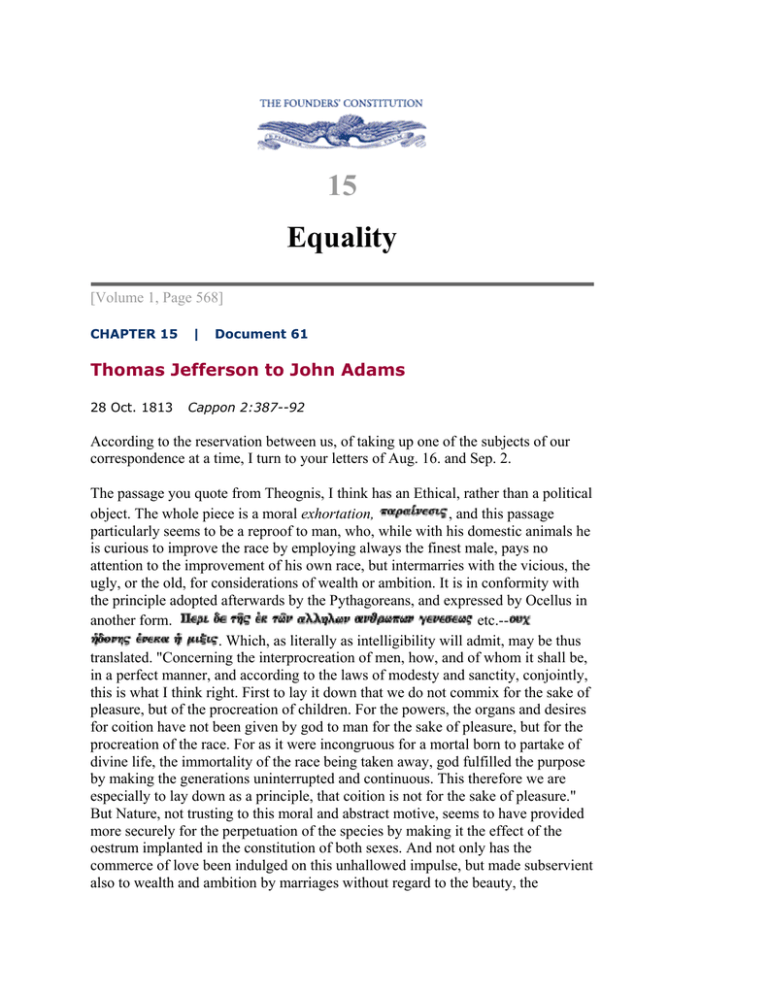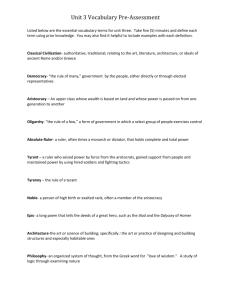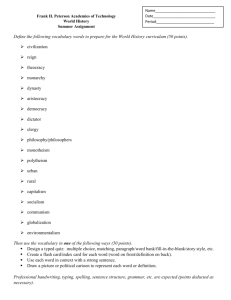15 Equality Thomas Jefferson to John Adams
advertisement

15 Equality [Volume 1, Page 568] CHAPTER 15 | Document 61 Thomas Jefferson to John Adams 28 Oct. 1813 Cappon 2:387--92 According to the reservation between us, of taking up one of the subjects of our correspondence at a time, I turn to your letters of Aug. 16. and Sep. 2. The passage you quote from Theognis, I think has an Ethical, rather than a political object. The whole piece is a moral exhortation, , and this passage particularly seems to be a reproof to man, who, while with his domestic animals he is curious to improve the race by employing always the finest male, pays no attention to the improvement of his own race, but intermarries with the vicious, the ugly, or the old, for considerations of wealth or ambition. It is in conformity with the principle adopted afterwards by the Pythagoreans, and expressed by Ocellus in etc.-another form. . Which, as literally as intelligibility will admit, may be thus translated. "Concerning the interprocreation of men, how, and of whom it shall be, in a perfect manner, and according to the laws of modesty and sanctity, conjointly, this is what I think right. First to lay it down that we do not commix for the sake of pleasure, but of the procreation of children. For the powers, the organs and desires for coition have not been given by god to man for the sake of pleasure, but for the procreation of the race. For as it were incongruous for a mortal born to partake of divine life, the immortality of the race being taken away, god fulfilled the purpose by making the generations uninterrupted and continuous. This therefore we are especially to lay down as a principle, that coition is not for the sake of pleasure." But Nature, not trusting to this moral and abstract motive, seems to have provided more securely for the perpetuation of the species by making it the effect of the oestrum implanted in the constitution of both sexes. And not only has the commerce of love been indulged on this unhallowed impulse, but made subservient also to wealth and ambition by marriages without regard to the beauty, the healthiness, the understanding, or virtue of the subject from which we are to breed. The selecting the best male for a Haram of well chosen females also, which Theognis seems to recommend from the example of our sheep and asses, would doubtless improve the human, as it does the brute animal, and produce a race of veritable [aristocrats]. For experience proves that the moral and physical qualities of man, whether good or evil, are transmissible in a certain degree from father to son. But I suspect that the equal rights of men will rise up against this privileged Solomon, and oblige us to continue acquiescence under the [the degeneration of the race of men] which Theognis complains of, and to content ourselves with the accidental aristoi produced by the fortuitous [Volume 1, Page 569] concourse of breeders. For I agree with you that there is a natural aristocracy among men. The grounds of this are virtue and talents. Formerly bodily powers gave place among the aristoi. But since the invention of gunpowder has armed the weak as well as the strong with missile death, bodily strength, like beauty, good humor, politeness and other accomplishments, has become but an auxiliary ground of distinction. There is also an artificial aristocracy founded on wealth and birth, without either virtue or talents; for with these it would belong to the first class. The natural aristocracy I consider as the most precious gift of nature for the instruction, the trusts, and government of society. And indeed it would have been inconsistent in creation to have formed man for the social state, and not to have provided virtue and wisdom enough to manage the concerns of the society. May we not even say that that form of government is the best which provides the most effectually for a pure selection of these natural aristoi into the offices of government? The artificial aristocracy is a mischievous ingredient in government, and provision should be made to prevent it's ascendancy. On the question, What is the best provision, you and I differ; but we differ as rational friends, using the free exercise of our own reason, and mutually indulging it's errors. You think it best to put the Pseudo-aristoi into a separate chamber of legislation where they may be hindered from doing mischief by their coordinate branches, and where also they may be a protection to wealth against the Agrarian and plundering enterprises of the Majority of the people. I think that to give them power in order to prevent them from doing mischief, is arming them for it, and increasing instead of remedying the evil. For if the coordinate branches can arrest their action, so may they that of the coordinates. Mischief may be done negatively as well as positively. Of this a cabal in the Senate of the U. S. has furnished many proofs. Nor do I believe them necessary to protect the wealthy; because enough of these will find their way into every branch of the legislation to protect themselves. From 15. to 20. legislatures of our own, in action for 30. years past, have proved that no fears of an equalisation of property are to be apprehended from them. I think the best remedy is exactly that provided by all our constitutions, to leave to the citizens the free election and separation of the aristoi from the pseudo-aristoi, of the wheat from the chaff. In general they will elect the real good and wise. In some instances, wealth may corrupt, and birth blind them; but not in sufficient degree to endanger the society. It is probable that our difference of opinion may in some measure be produced by a difference of character in those among whom we live. From what I have seen of Massachusets and Connecticut myself, and still more from what I have heard, and the character given of the former by yourself, who know them so much better, there seems to be in those two states a traditionary reverence for certain families, which has rendered the offices of the government nearly hereditary in those families. I presume that from an early period of your history, members of these families happening to possess virtue and talents, have honestly exercised them for the good of the people, and by their services have endeared their names to them. In coupling Connecticut with you, I mean it politically only, not morally. For having made the Bible the Common law of their land they seem to have modelled their morality on the story of Jacob and Laban. But altho' this hereditary succession to office with you may in some degree be founded in real family merit, yet in a much higher degree it has proceeded from your strict alliance of church and state. These families are canonised in the eyes of the people on the common principle "you tickle me, and I will tickle you." In Virginia we have nothing of this. Our clergy, before the revolution, having been secured against rivalship by fixed salaries, did not give themselves the trouble of acquiring influence over the people. Of wealth, there were great accumulations in particular families, handed down from generation to generation under the English law of entails. But the only object of ambition for the wealthy was a seat in the king's council. All their court then was paid to the crown and it's creatures; and they Philipised in all collisions between the king and people. Hence they were unpopular; and that unpopularity continues attached to their names. A Randolph, a Carter, or a Burwell must have great personal superiority over a common competitor to be elected by the people, even at this day. At the first session of our legislature after the Declaration of Independance, we passed a law abolishing entails. And this was followed by one abolishing the privilege of Primogeniture, and dividing the lands of intestates equally among all their children, or other representatives. These laws, drawn by myself, laid the axe to the root of Pseudoaristocracy. And had another which I prepared been adopted by the legislature, our work would have been compleat. It was a Bill for the more general diffusion of learning. This proposed to divide every county into wards of 5. or 6. miles square, like your townships; to establish in each ward a free school for reading, writing and common arithmetic; to provide for the annual selection of the best subjects from these schools who might receive at the public expense a higher degree of education at a district school; and from these district schools to select a certain number of the most promising subjects to be compleated at an University, where all the useful sciences should be taught. Worth and genius would thus have been sought out from every condition of life, and compleatly prepared by education for defeating the competition of wealth and birth for public trusts. My proposition had for a further object to impart to these wards those portions of self-government for which they are best qualified, by confiding to them the care of their poor, their roads, police, elections, the nomination of jurors, administration of justice in small cases, elementary exercises of militia, in short, to have made them little republics, with a Warden at the head of each, for all those concerns which, being under their eye, they would better manage than the larger republics of the county or state. A general call of ward-meetings by their Wardens on the same day thro' the state would at any time produce the genuine sense of the people on any required point, and [Volume 1, Page 570] would enable the state to act in mass, as your people have so often done, and with so much effect, by their town meetings. The law for religious freedom, which made a part of this system, having put down the aristocracy of the clergy, and restored to the citizen the freedom of the mind, and those of entails and descents nurturing an equality of condition among them, this on Education would have raised the mass of the people to the high ground of moral respectability necessary to their own safety, and to orderly government; and would have compleated the great object of qualifying them to select the veritable aristoi, for the trusts of government, to the exclusion of the Pseudalists: and the same Theognis who has furnished the epigraphs of your two letters assures us that ["Curnis, good men have never " harmed any city"]. Altho' this law has not yet been acted on but in a small and inefficient degree, it is still considered as before the legislature, with other bills of the revised code, not yet taken up, and I have great hope that some patriotic spirit will, at a favorable moment, call it up, and make it the key-stone of the arch of our government. With respect to Aristocracy, we should further consider that, before the establishment of the American states, nothing was known to History but the Man of the old world, crouded within limits either small or overcharged, and steeped in the vices which that situation generates. A government adapted to such men would be one thing; but a very different one that for the Man of these states. Here every one may have land to labor for himself if he chuses; or, preferring the exercise of any other industry, may exact for it such compensation as not only to afford a comfortable subsistence, but wherewith to provide for a cessation from labor in old age. Every one, by his property, or by his satisfactory situation, is interested in the support of law and order. And such men may safely and advantageously reserve to themselves a wholsome controul over their public affairs, and a degree of freedom, which in the hands of the Canaille of the cities of Europe, would be instantly perverted to the demolition and destruction of every thing public and private. The history of the last 25. years of France, and of the last 40. years in America, nay of it's last 200. years, proves the truth of both parts of this observation. But even in Europe a change has sensibly taken place in the mind of Man. Science had liberated the ideas of those who read and reflect, and the American example had kindled feelings of right in the people. An insurrection has consequently begun, of science, talents and courage against rank and birth, which have fallen into contempt. It has failed in it's first effort, because the mobs of the cities, the instrument used for it's accomplishment, debased by ignorance, poverty and vice, could not be restrained to rational action. But the world will recover from the panic of this first catastrophe. Science is progressive, and talents and enterprize on the alert. Resort may be had to the people of the country, a more governable power from their principles and subordination; and rank, and birth, and tinsel-aristocracy will finally shrink into insignificance, even there. This however we have no right to meddle with. It suffices for us, if the moral and physical condition of our own citizens qualifies them to select the able and good for the direction of their government, with a recurrence of elections at such short periods as will enable them to displace an unfaithful servant before the mischief he meditates may be irremediable. I have thus stated my opinion on a point on which we differ, not with a view to controversy, for we are both too old to change opinions which are the result of a long life of inquiry and reflection; but on the suggestion of a former letter of yours, that we ought not to die before we have explained ourselves to each other. We acted in perfect harmony thro' a long and perilous contest for our liberty and independance. A constitution has been acquired which, tho neither of us think perfect, yet both consider as competent to render our fellow-citizens the happiest and the securest on whom the sun has ever shone. If we do not think exactly alike as to it's imperfections, it matters little to our country which, after devoting to it long lives of disinterested labor, we have delivered over to our successors in life, who will be able to take care of it, and of themselves. The Founders' Constitution Volume 1, Chapter 15, Document 61 http://press-pubs.uchicago.edu/founders/documents/v1ch15s61.html The University of Chicago Press The Adams-Jefferson Letters: The Complete Correspondence between Thomas Jefferson and Abigail and John Adams. Edited by Lester J. Cappon. 2 vols. Chapel Hill: University of North Carolina Press for the Institute of Early American History and Culture, Williamsburg, Virginia, 1959. © 1987 by The University of Chicago All rights reserved. Published 2000 http://press-pubs.uchicago.edu/founders/









